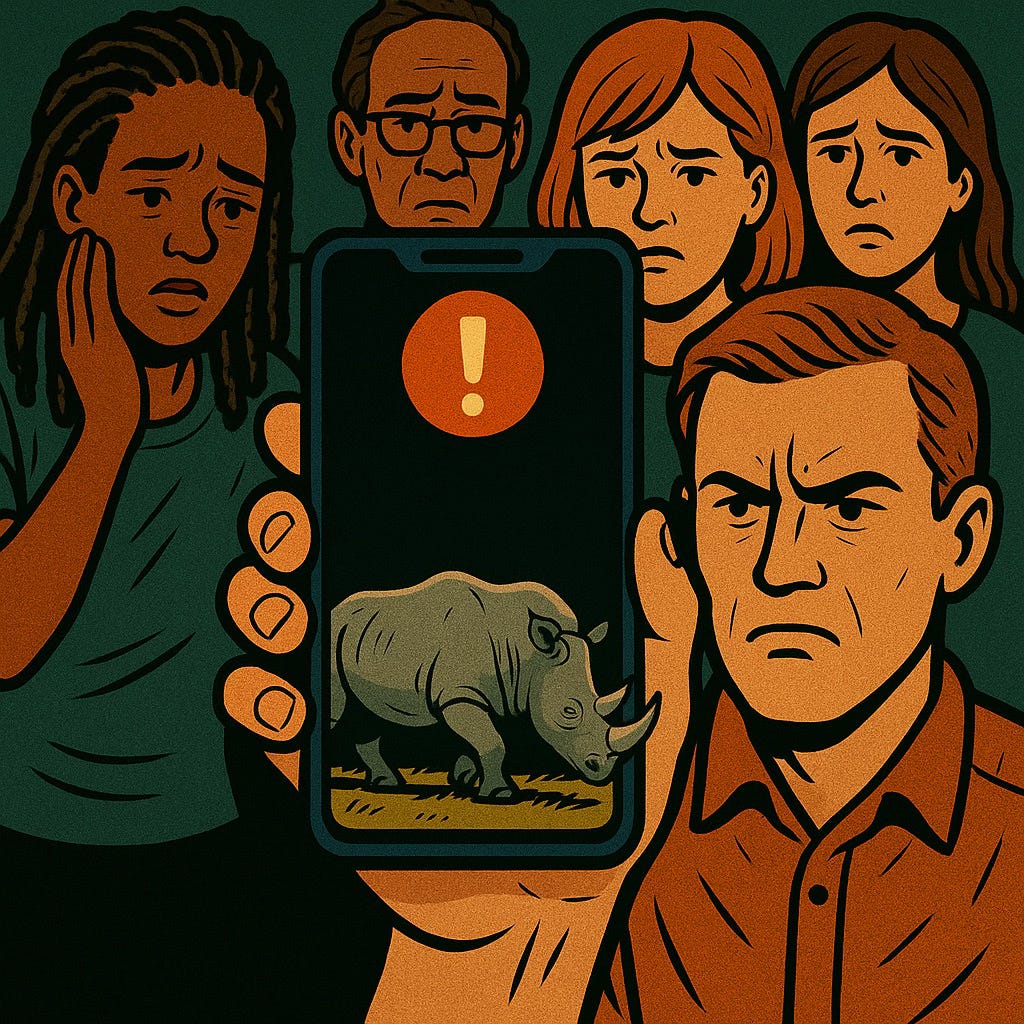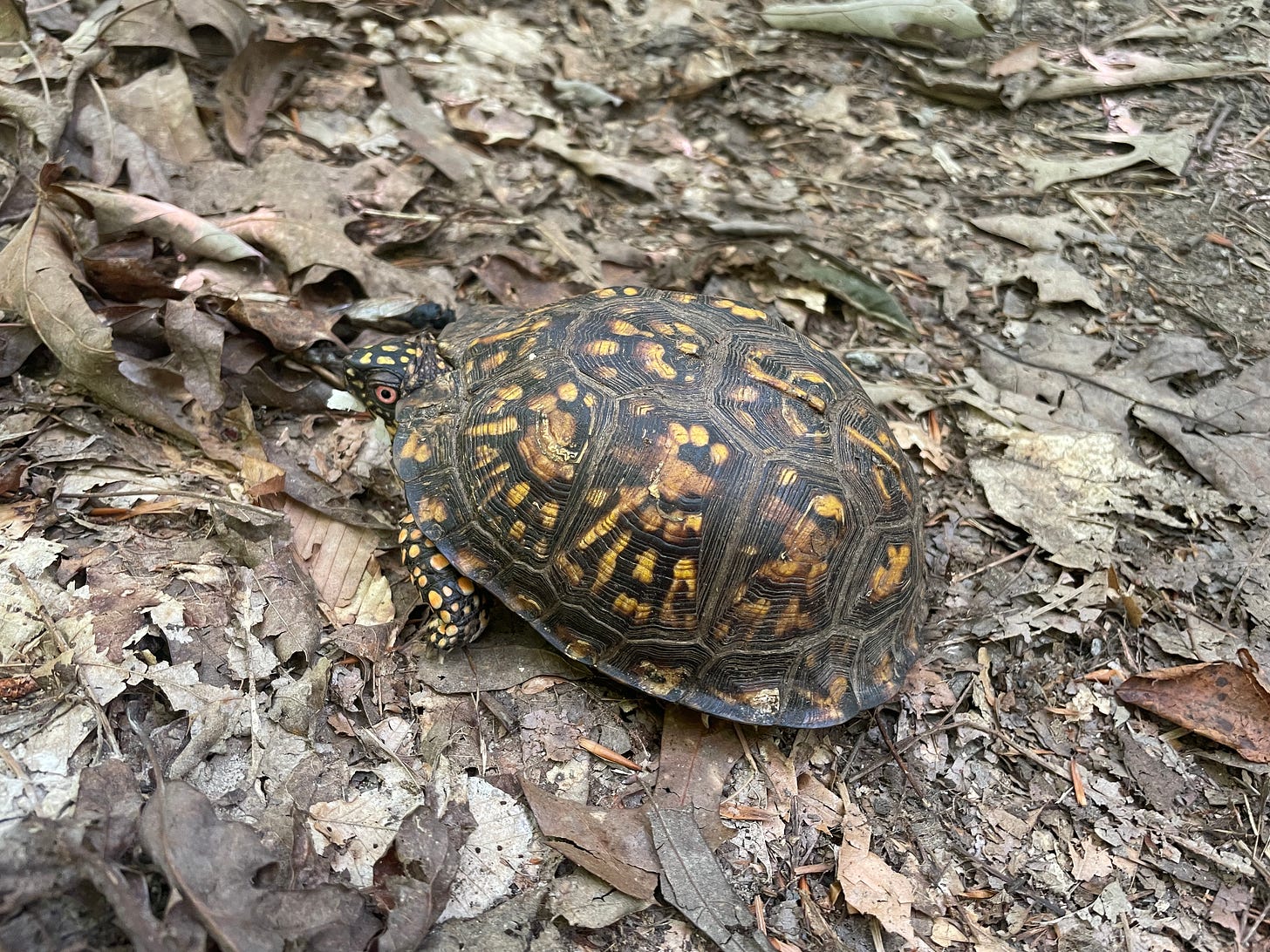Communal Catastrophizing. Or How Social Media Trains Us to Despair Together
Bad News Is Addictive. Even When It’s Fake.
Diogenes In Exile is reader-supported. Keep the lamp of truth burning by becoming a paying subscriber—or toss a few drachmas in the jar with a one-time or recurring donation. Cynics may live in barrels, but websites aren’t free!
I made the mistake of checking Facebook.
Most of the time, I’m too busy to hang out there, but once in a while, I’ll pop in to share something I’ve written or check up on old friends and family. This time, I happened to catch a post from a friend that looked like an article about white rhinos going extinct. Her comment leading into the piece reads like a funeral dirge for the human species: We must do better.
My first thought: Wait—white rhinos are extinct? That should be huge news. I hadn’t heard anything. Before Googling, I checked the comments—hoping someone else had already dug into it. I wasn’t disappointed.
The relevant information was there—buried beneath five or six comments mourning the rhinos, and a few more declaring that humanity is a plague on the planet.
Here’s the actual story: white rhinos are not extinct. The northern subspecies lost its last male in 2018, a genuine tragedy. But the southern white rhino is making a solid comeback—thanks to humans. Conservationists, scientists, donors, local communities—all doing good work.
Did this hopeful fact change the tone of the comment section? Of course not. Further down, people were still piling on about how terrible humans are. I briefly considered asking if they’d prefer lions to take over, but I thought better of it. (They seemed to be enjoying their attack of the vapors. And since when does being snarky do anything to change minds?)
What I had witnessed is what I call Communal Catastrophizing—a kind of social despair spiral. One person posts a worst-case take. Others pile on. Before long, a whole group is wallowing in a distorted version of reality, bonded by outrage and grief. The facts become irrelevant. But at least folks can feel connected to the gang in their despondent melancholy.
In another post, a different friend shared two side-by-side images of a meteorologist supposedly illustrating the horror of global warming. One said “BEFORE,” the other “AFTER.” In the first image, the weather map behind her was green and blue, showing topography and scattered temperature readings. In the “AFTER” image, the map was red and orange—hot and ominous—but the temperatures were actually lower.
A sharp-eyed commenter pointed this out. Didn’t matter. The image was still getting shared as proof of climate catastrophe.
Both posts were clearly designed to elicit outrage about the environment—true or not. And because we’re a social species, emotions ripple through our networks, regardless of whether they’re grounded in reality.
This isn’t a defense of ignorance. And it’s not a denial of environmental or ecological concerns. But even if the worst were true—that the white rhino was gone, and the south of France had become a toaster oven—what good does despair do?
Hopelessness is not a moral high ground. It’s a paralysis.
When we treat despair as truth and outrage as virtue, we stop thinking clearly—and we stop seeing each other clearly. We overlook the many people who are trying, quietly and imperfectly, to make things better. Like the people who saved the southern white rhino. (And who, by the way, tried to save the northern ones too. They just failed. That happens sometimes.)
To insist that the world is hopeless simply because others aren’t solving problems fast enough or your way—that’s not realism. It’s narcissism. Especially in a world where much of what we’re told is “settled science” has later turned out to be politicized, distorted, or just plain wrong.
Let’s even suppose the doomsayers are right. Even if the worst worst-case scenarios are all coming true—does wallowing help? Or is it just a way to give ourselves permission to do nothing?
The last post I saw before logging off was about how mowing your lawn is devastating the mason bees.
Folks, if you're worried about the mason bees, get off Facebook and build them a tube nest. Seriously.
Housekeeping
Poppet and I had a two box turtle day last week. I’ve never seen them so plentiful. I give credit to the cicada corpses. The circle of life.
Also, Happy Fourth of July! Enjoy your holiday and drive safely. Our country may not be perfect, and it may feel tempting to see only the bad, especially if that’s all your friends can see, but just say no to that communal catastrophizing. The truth is we are very very lucky to be holding on to the freedom we have here, even if it is only just. It is unique in the world.
We also need to continue to weed out corruption and do our part to preserve and restore that imperfect, miracle of liberty the founding fathers handed us.
Double box turtles.
On the Bookshelf
I have not made a lot of progress on the back catalog, but, as one should, I’ve added another, must-read at the top of the pile. I’ve already listened to this twice, but I need to do a thorough review and write about it so the details start to stick.
NEW BOOK- MUST READ - Your Consent Is Not Required by Rob Wipond.
Accreditation on the Edge: Challenging Quality Assurance in Higher Education by Susan D. Phillips
The Case Against Education by Bryan Caplan
The Licensing Racket: How We Decide Who Is Allowed to Work, and Why It Goes Wrong by Rebecca Haw Allensworth
Moral Calculations: Game Theory, Logic and Human Frailty by Laszlo Mero
The New Know-nothings: The Political Foes of the Scientific Study of Human Nature by Morton Hunt
The New Oxford Annotated Bible with Apocrypha: New Revised Standard by Marc Brettler, Carol Newsom, Pheme Perkins
Surely You’re Joking, Mr. Feynman! Adventures of a Curious Character by Richard Feynman
We Have Never Been Woke: The Cultural Contradictions of the New Elite by Musa al-Gharbi
“Whatever It Is, I’m Against It”: Resistance to Change in Higher Education by Brian Rosenberg
Help Keep This Conversation Going!
Share this post on social media–it costs nothing but helps a lot.
Want more perks? Subscribe to get full access to the article archive.
Become a Paid Subscriber to get video and chatroom.
Support from readers like you keeps this project alive!
Diogenes in Exile is reader-supported. If you find value in this work, please consider becoming a pledging/paid subscriber, donating to my GiveSendgo, or buying Thought Criminal merch. I’m putting everything on the line to bring this to you because I think it is just that important, but if you can, I need your help to keep this mission alive.
Already a Premium subscriber? Share your thoughts in the chat room.
About
Diogenes in Exile began after I returned to grad school to pursue a Clinical Mental Health Counseling master’s degree at the University of Tennessee. What I encountered, however, was a program deeply entrenched in Critical Theories ideology. During my time there, I experienced significant resistance, particularly for my Buddhist practice, which was labeled as invalidating to other identities. After careful reflection, I chose to leave the program, believing the curriculum being taught would ultimately harm clients and lead to unethical practices in the field.
Since then, I’ve dedicated myself to investigating, writing, and speaking out about the troubling direction of psychology, higher education, and other institutions that seem to have lost their way. When I’m not working on these issues, you’ll find me in the garden, creating art, walking my dog, or guiding my kids toward adulthood.
You can also find my work at Minding the Campus






